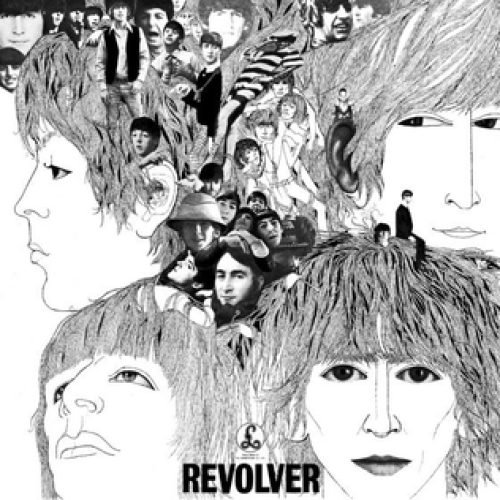Revolver stands as a monumental pivot in The Beatles‘ illustrious discography, marking a period where the Fab Four transitioned from the mop-topped pop sensations of the early ’60s to studio-bound sonic alchemists. Released in August 1966, this album arrived at a crucial juncture in the broader music landscape, embodying the psychedelic zeitgeist of the late ’60s while pushing the boundaries of what pop music could be. Compared to its predecessors, Revolver represents a seismic shift, both in terms of thematic depth and sonic experimentation, serving as a beacon of innovation that would illuminate the path for countless artists and genres in its wake.
Artistic Intentions
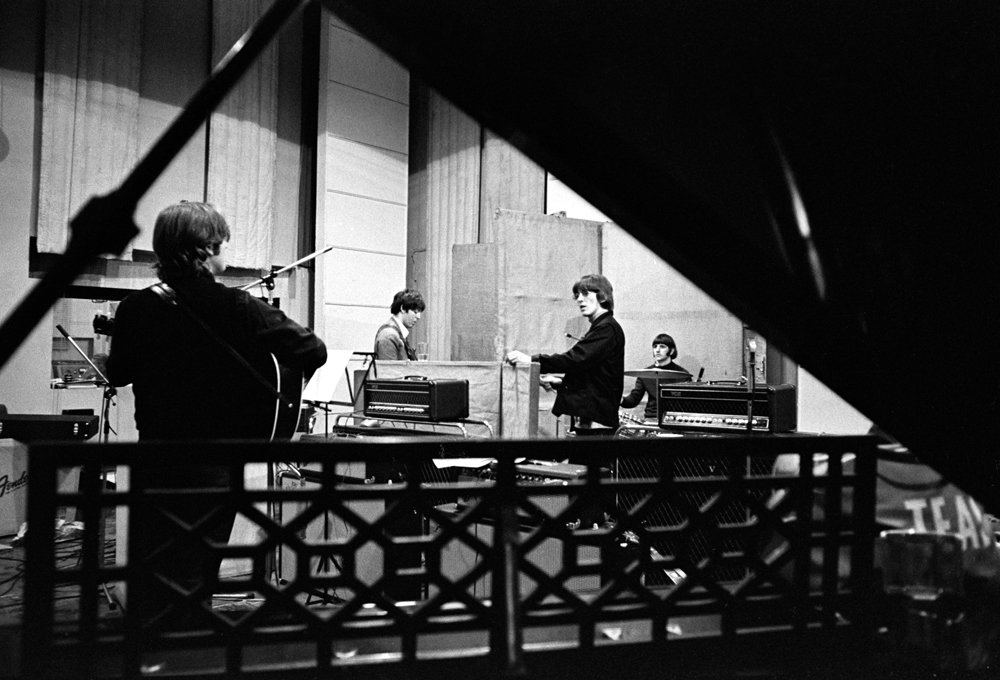
The artistic intentions behind Revolver are as multifaceted as the album itself. The Beatles, fresh from their final tour and disillusioned with the limitations of live performance, sought to exploit the studio’s potential as an instrument in its own right. This was an era unfettered by the pressures of touring, affording the band the luxury of time to experiment with avant-garde recording techniques, novel instrumentations, and complex song arrangements. Their aim was nothing short of redefining what a pop album could convey, both in terms of lyrical sophistication and auditory experience.
We were having more fun in the studio, from Revolver. Rubber Soul, as it was getting more experimental. The songs were getting better. More interesting… So that’s where we were going.
Ringo Starr on making Revolver
John Lennon, Paul McCartney, George Harrison, and Ringo Starr, alongside their visionary producer George Martin, embarked on a quest to expand the palette of pop music, drawing from a diverse array of influences: classical Indian music, the nascent genre of psychedelic rock, and the avant-garde, among others. Interviews from the period reveal a band at the zenith of their creative powers, eager to chart unexplored territories. McCartney’s musings on wanting to create “an album that was a complete piece of art” and Lennon’s experiments with tape loops and backward recordings exemplify the band’s shift towards a more introspective and experimental approach.
Sonic Exploration
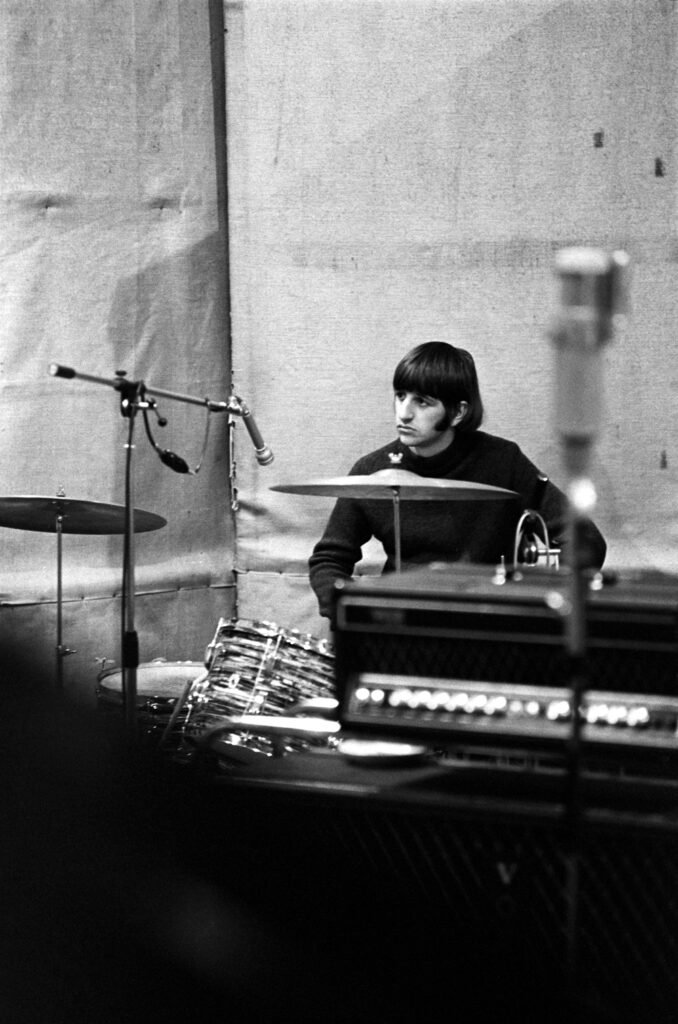
Revolver‘s sonic landscape is a tapestry of innovation, marked by a production quality that was groundbreaking for its time. Under the stewardship of producer George Martin and engineer Geoff Emerick, the album’s production eschewed the then-prevailing crispness and clarity for a more exploratory approach that could be considered avant-garde. This was not production for production’s sake; every sonic element served the album’s themes of introspection, love, and societal commentary, enveloping listeners in a cocoon of auditory wonder that was both intimate and expansive. The use of techniques such as automatic double tracking, varispeed, and backwards recording endowed the album with a texture that was as rich and complex as the themes it explored.
Musical Arrangements
Musical arrangements on Revolver are nothing short of revolutionary. The album flirts with a cornucopia of sounds: from the string octet on “Eleanor Rigby” that paints a haunting picture of loneliness, to the Indian sitar and tabla infusing “Love You To” with a hypnotic, raga-rock allure. “Tomorrow Never Knows” serves as a sonic odyssey in its own right, with Lennon’s vocals snaking through a labyrinth of tape loops, seagull cries (achieved through manipulated feedback), and a droning tambura, creating an immersive soundscape that many consider a precursor to modern electronic music. These arrangements are not merely innovative; they are transformative, inviting the listener to experience music in a way that transcends conventional pop song structures.
Genre Elements
The Beatles’ Revolver traverses a wide spectrum of musical genres, seamlessly blending elements of psychedelic rock, classical, Indian music, and traditional pop into a cohesive whole that defies easy categorization. This genre-blending is not just novel; it is revelatory, demonstrating an unparalleled versatility and a daring to venture where few mainstream artists had dared to tread. The album’s foray into psychedelia is perhaps its most defining genre exploration, with tracks like “Tomorrow Never Knows” and “I’m Only Sleeping” embodying the psychedelic experience through their lyrical themes and groundbreaking soundscapes.
Lyrical Analysis
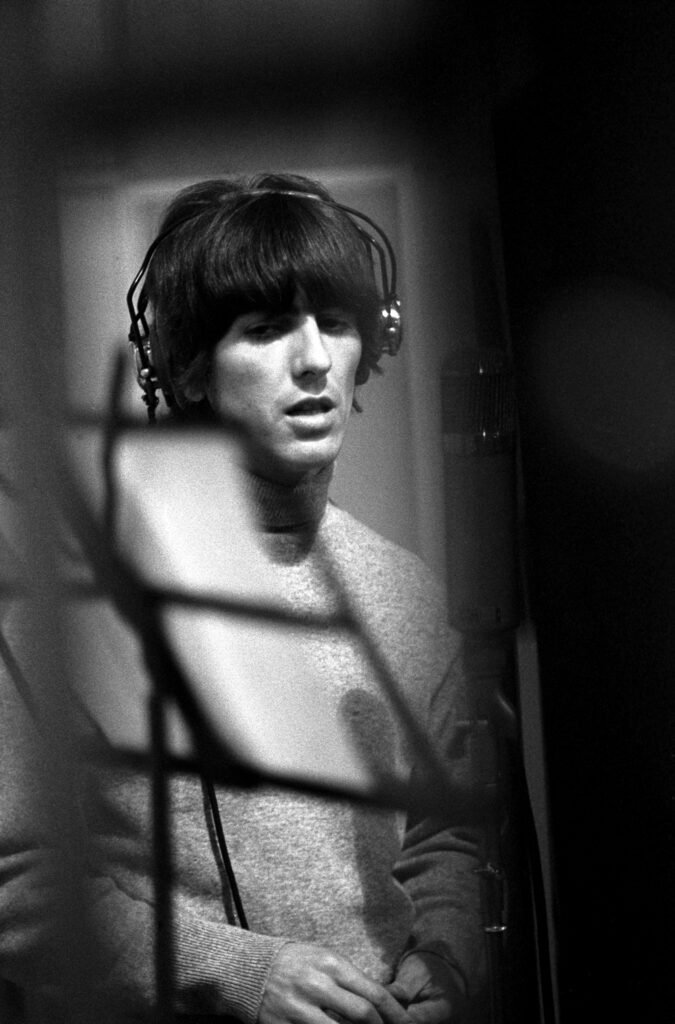
The lyrical tapestry of Revolver is as rich and varied as its musical landscapes, weaving together themes of love, introspection, existential angst, and social commentary into a coherent narrative that speaks volumes about the human condition. This thematic diversity is matched by the complexity and poetic nature of the lyrics, which oscillate between the straightforward and the abstract, offering layers of meaning that invite deep reflection and interpretation.
Lyrical Depth
Central to Revolver is the exploration of the self and the external world. “Eleanor Rigby” delves into the loneliness and despair of modern life, painting a vivid picture of isolation through its poignant narrative and stark imagery. In contrast, “Here, There and Everywhere” captures the sublime nature of love with its tender simplicity and emotional depth. The album also ventures into more existential territories with “Tomorrow Never Knows,” drawing on The Tibetan Book of the Dead to offer a kaleidoscopic meditation on life, death, and rebirth, encapsulated in lyrics that are as mystifying as they are enlightening.
The Beatles’ lyrical prowess on Revolver is evident in their ability to blend narrative clarity with poetic abstraction. Songs like “I’m Only Sleeping” and “She Said She Said” flirt with surrealism and stream of consciousness, challenging listeners to find their own meaning in the labyrinthine lyrics. This complexity does not obscure the album’s messages but rather enriches them, offering a multiplicity of interpretations that resonate on a deeply personal level.
Emotional Impact
The emotional impact of Revolver‘s lyrics cannot be overstated. Through their storytelling and evocative imagery, The Beatles engage the listener’s empathy, joy, sadness, and contemplation. The melancholy of “Eleanor Rigby” and “For No One” is palpable, leaving a lasting impression of the ephemeral nature of happiness and love. Conversely, the whimsy of “Yellow Submarine” and the optimism of “Good Day Sunshine” provide a counterbalance, showcasing the band’s ability to traverse the emotional spectrum with ease and authenticity.
Cohesion and Flow

The genius of Revolver lies not just in its groundbreaking individual tracks but in the meticulous way these pieces are woven together, creating an album that transcends the sum of its parts. The track progression on Revolver is a masterclass in sequencing, balancing musical diversity with thematic unity to craft a listening experience that is both varied and cohesive. This careful arrangement ensures a narrative and emotional progression that ties the album together, guiding the listener through a journey that is as intellectually stimulating as it is emotionally resonant.
From the melancholic strings of “Eleanor Rigby” to the final, haunting chord of “Tomorrow Never Knows,” Revolver unfolds like a carefully plotted narrative, each track contributing to an overarching story about love, life, loneliness, and existential wonder. The transition from the optimistic “Good Day Sunshine” to the introspective “And Your Bird Can Sing” exemplifies this balance, mirroring the album’s exploration of external joy and internal reflection. The sequencing is such that each track feels like a natural progression from the last, both musically and thematically, allowing the listener to fully immerse in the album’s complex emotional landscape.
Thematic Consistency
Thematic consistency is another hallmark of Revolver. Despite the wide array of styles and genres explored, the album maintains a cohesive feel that is nothing short of remarkable. This is achieved not just through the recurring lyrical themes of introspection, social commentary, and the human psyche, but also through the innovative use of studio techniques and musical arrangements that serve as a sonic thread weaving through the album. Even as the album shifts from the classical leanings of “Eleanor Rigby” to the psychedelic tapestries of “Tomorrow Never Knows,” there is a sense of unity in the exploratory spirit and emotional depth that characterizes Revolver.
However, Revolver’s cohesion does not come at the expense of diversity. The album’s brilliance lies in its ability to embrace contrast — the playful alongside the profound, the simple next to the complex. Rather than creating jarring shifts, these variations enrich the listener’s experience, highlighting The Beatles’ unparalleled ability to navigate different emotional and thematic territories with ease. The juxtaposition of tracks like the light-hearted “Yellow Submarine” against the introspective “She Said She Said” contributes to the album’s dynamic range, yet never detracts from its overall coherence.
Standout Tracks and Moments
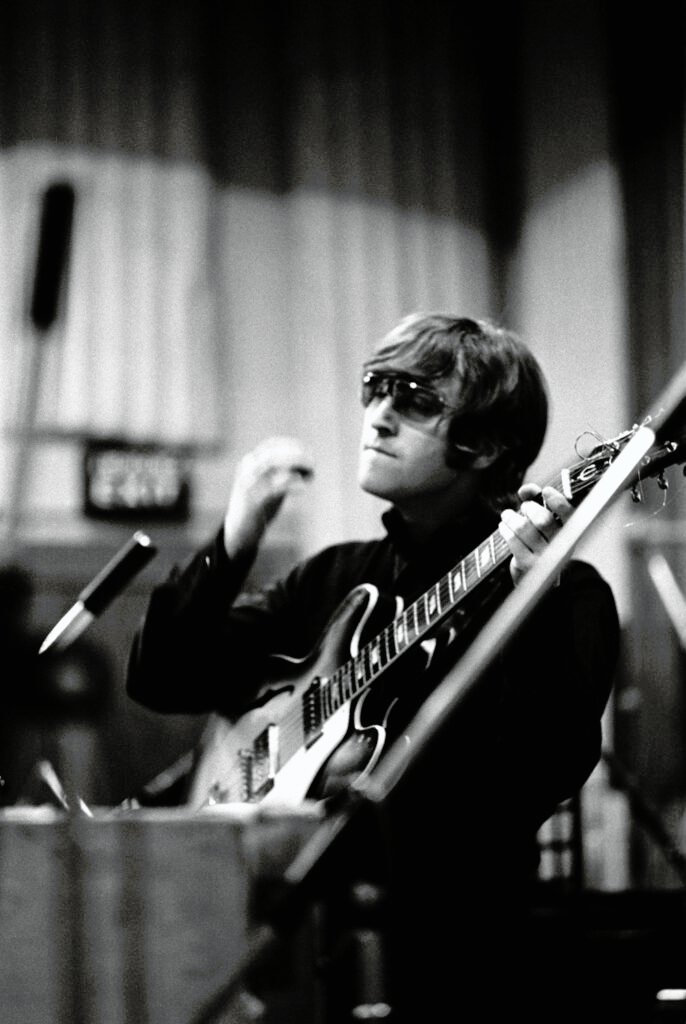
Revolver is an album replete with musical and lyrical epiphanies, but among its rich tapestry of sound, several tracks stand as pillars of artistic innovation and emotional profundity. These key tracks not only highlight The Beatles’ mastery over their craft but also encapsulate the essence of the album’s groundbreaking spirit.
Key Tracks
“Eleanor Rigby” is a masterpiece of narrative songwriting, set apart by its stark, string octet arrangement and haunting lyrics about loneliness and disconnect in modern society. This track is a departure from anything The Beatles had done before, merging classical music with pop sensibilities in a way that was both innovative and deeply moving. The absence of traditional rock instrumentation makes the song’s emotional impact — underscored by the refrain, “Ah, look at all the lonely people” — even more poignant.
“Tomorrow Never Knows” marks the zenith of the album’s foray into psychedelia and studio experimentation. Built around a single chord and a mesmerizing tape loop collage, the track is a sonic odyssey that explores the outer limits of music production. Lennon’s processed vocals, inspired by Tibetan monk chanting, and the swirling, otherworldly soundscape make this track not just a standout, but a pivotal moment in the history of recorded music, signaling new possibilities for the use of the studio as an instrument.
“I’m Only Sleeping,” with its languid tempo and backward guitar solos, is another highlight. The track stands out for its depiction of the blissful inertia of sleep, set against an innovative musical backdrop that includes one of the first uses of reversed guitar sounds on a pop record. This experimentation not only showcased Harrison’s burgeoning talent as a lead guitarist but also The Beatles’ willingness to push the boundaries of conventional songwriting and recording techniques.
Memorable Moments
Among the album’s memorable moments, the opening strings of “Eleanor Rigby” instantly capture the listener’s attention, setting the tone for an album that would consistently defy expectations. The seamless transition from the sun-kissed harmonies of “Here, There and Everywhere” to the crunching guitars of “She Said She Said” encapsulates the album’s dynamic range and thematic depth. Moreover, the closing sequence of “Tomorrow Never Knows,” with its cacophony of sound effects and tape loops, leaves an indelible mark on the listener, serving as a powerful finale that encapsulates the album’s exploratory ethos.
These tracks and moments are emblematic of Revolver‘s significance, not just as a collection of songs, but as a landmark in the evolution of popular music. Through these standout elements, The Beatles did not merely create an album; they crafted an experience that challenged and expanded the artistic and emotional horizons of their audience, cementing Revolver’s legacy as a beacon of musical innovation and creative ambition.
Artistic Contribution and Innovation
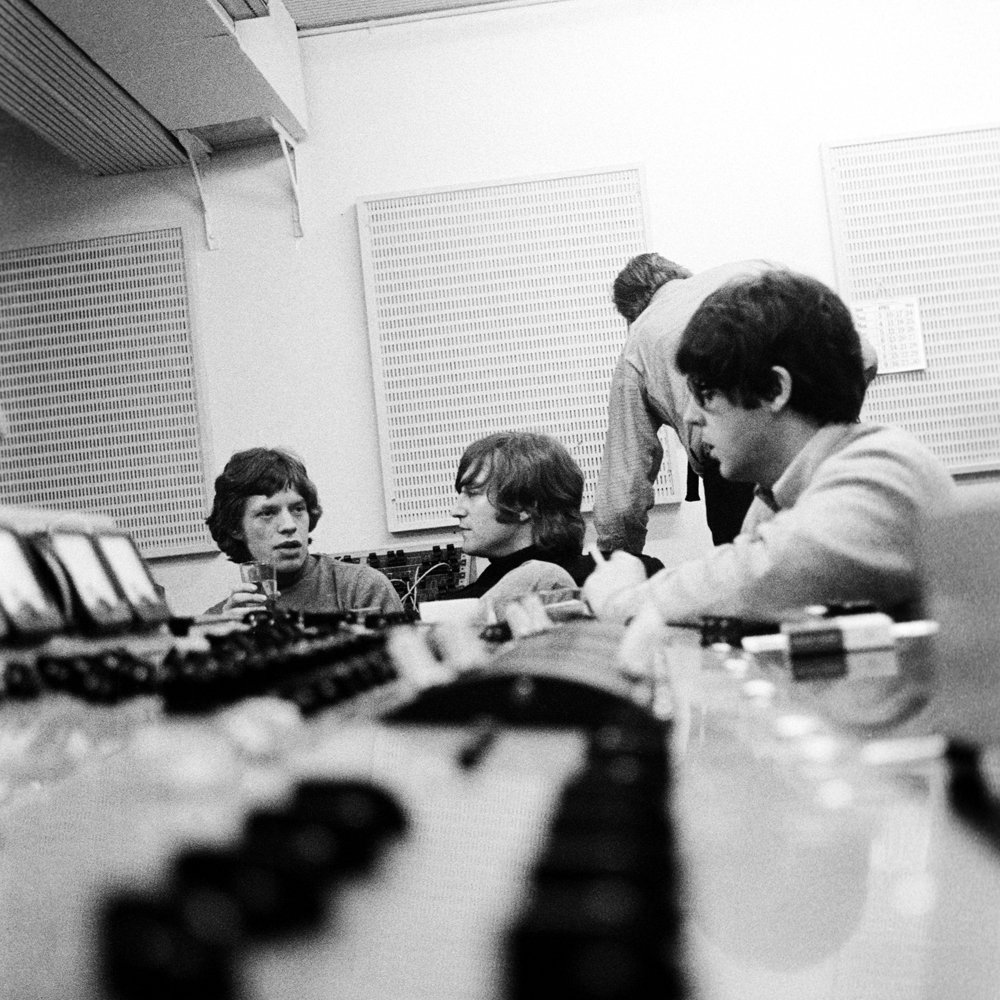
Revolver occupies a unique and venerable place within not just its genre but the music industry at large. Its release marked a pivotal moment when pop music was irrevocably transformed into a medium for artistic expression and experimentation. Far from adhering to the established norms of the early 1960s, Revolver shattered them, pushing the boundaries of what popular music could achieve in terms of both production and thematic depth. Its legacy is one of fearless innovation, setting the stage for the progressive and psychedelic movements that would follow and influencing countless genres and artists in the decades to come.
Production
One of the most innovative aspects of Revolver is undoubtedly its production. The album made pioneering use of studio techniques such as varispeed, tape loops, and automatic double tracking, revolutionizing the recording process. The production on tracks like “Tomorrow Never Knows” and “Eleanor Rigby” was not just groundbreaking; it was transformative, changing the way artists and producers thought about the recording studio. The studio became an instrument in its own right, a place where the boundaries of sound could be explored and expanded. This approach to production laid the groundwork for future musical exploration, from the intricate studio albums of the late 60s and 70s to the electronic and digital innovations of the modern era.
Genre
In terms of genre, Revolver is a testament to The Beatles’ eclectic tastes and willingness to incorporate diverse influences into their music. The album blends elements of psychedelic rock, classical, pop, and Indian music, among others, creating a sound that was not just fresh but unprecedented. This genre-blending was more than just innovation for innovation’s sake; it was a bold statement about the universality of music and its power to transcend cultural and stylistic barriers. Revolver demonstrated that pop music could be as complex and varied as any other art form, challenging the industry’s conventions and inspiring a new generation of artists to experiment with their sounds.
Themes
Thematically, Revolver also broke new ground. The album explored topics like love, loneliness, and existentialism with a depth and sophistication that was rare in popular music at the time. Songs like “Eleanor Rigby” and “Tomorrow Never Knows” delved into the human psyche and the nature of reality, topics that were not typically explored in the pop music of the early 60s. This thematic exploration contributed to the album’s innovation, proving that pop music could be a vehicle for serious and profound commentary on the human condition.
Closing Thoughts

In the pantheon of musical innovation and artistic achievement, Revolver by The Beatles stands as a colossus. Through its exploration of new studio techniques, its daring genre fusion, and its profound thematic inquiries, the album marks a seminal point in both the band’s career and the broader music industry. The strengths of Revolver are manifold, from its pioneering production values to its lyrical depth and musical diversity. Each track serves as a testament to The Beatles’ artistic evolution, showcasing their ability to blend pop sensibilities with avant-garde experimentation in a manner that was both accessible and deeply complex.
If one were to search for weaknesses, they would find that any perceived shortcomings are instead quirks that further endear the album to its listeners, contributing to its unique character. The album’s experimentation, while bold and boundary-pushing, never feels self-indulgent. Instead, it’s executed with a level of craftsmanship and artistic integrity that has ensured Revolver remains a timeless piece, as fresh and relevant today as it was upon its release.
The potential impact of Revolver on its listeners cannot be understated. It is an album that invites exploration and reflection, offering new layers of meaning with each listen. For The Beatles, Revolver represents a pivotal moment of transformation, a bridge from their early pop success to their later, more introspective work. It is a bold declaration of artistic freedom and a showcase of their unparalleled creativity.
Official Rating
Awarding Revolver a perfect score of 10 out of 10 is not just a reflection of its flawless execution and groundbreaking innovation; it’s an acknowledgment of its profound impact on the music landscape. This album redefined what popular music could be, challenging artists to push the boundaries of their creative expression. Its influence is immeasurable, resonating through the decades and inspiring artists across genres to explore, experiment, and express in ways previously unimagined.
